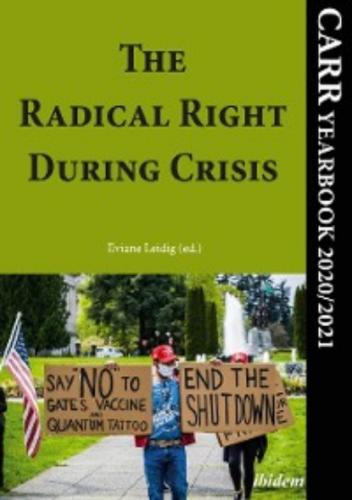The Radical Right During Crisis. Группа авторов
Did Heidegger Emerge as the Central Philosopher of the Far-Right?
Sweden Heading Towards “Academic Freedom” as Battlefield of the Radical Right
Why is the Brazilian Right Afraid of Pablo Freire?
The Right’s War on Science & Experts Escalates Amid COVID-19
What WhatsApp Conversations Reveal About the Far-Right’s Ideology
Racist Occultism in the UK: Behind the Order of Nine Angles (O9A)
Sexuality and Gender
Incels: Alienated Men and Violence in the Digital Age
The Proud Boys Are Standing By
Marching On, But Not Together: The Georgian Far Right versus Guram Kashia
Turning Family Into a Political Weapon
Islamophobia in Sri Lanka, or the Sterilization Obsession
The Radical Right is Exploiting a Swedish Teen’s Murder
New Voter Strongholds
When Ethnic Minorities Vote for Right-Wing Populism
In Bed with the Far Right in Thuringia: A Watershed Moment for Muslim CDU supporters?
The German AfD Makes Appeals to Russian-Germans
The Radical Right in Turmoil
Disunity within the Ranks? Party Expulsions in the European Radical Right: 2000-2020
Is Italian Right-Wing Populism in Decline?
The Dusk after the Dawn: Fall of a Greek Neo-Nazi Party
Countering the Radical Right
Collecting Hate: The Ethics of Archiving and Researching on the Radical and Far-Right
Treating “White Men” as a New “Suspect Community” is Not the Answer
Tackling Online Radicalisation at Its Offline Roots
Moving Away from Islamist Extremism: Assessing Counter Narrative Responses to the Far-Right Online
How to Counter Radical Right Narratives Head on
Can Anything Be Done Against Radical Right Misinformation?
The Effects of Censoring the Far-Right Online
Is Antifa the Answer to Today’s Fascism?
How to Laugh Away the Far-Right: Lessons from Germany
Preface
To say that 2020 was a memorable year would be an understatement. While the COVID-19 pandemic overshadowed all else and would quickly have a lasting impact on our daily lives, other events related to the radical right soon surfaced.
The year started off with tragedy as a shooter in Hanau, Germany opened fire targeting Turkish “immigrants” (although in reality German citizens). Driven by racist and misogynist conspiracy theories, the terrorist uploaded a manifesto and YouTube video shortly before carrying out the attack. Only a few days later, riots broke out in New Delhi, India, as Hindu nationalist mobs descended onto Muslim neighbourhoods in brazen acts of violence that left dozens dead and hundreds injured. The riots were incited by far right politicians who equated protesters—of a newly passed bill that discriminates citizenship based on religion—as anti-national and worthy targets of murder.
Soon after the World Health Organization declared COVID-19 a global pandemic in March, we witnessed radical right leaders enact sweeping authoritarian powers, weaponizing upon societal instability to bolster their agendas. Viktor Orbán’s Fidesz party in Hungary passed legislation that would allow the prime minister to rule by decree indefinitely, thus further contributing to erosion of democracy. Meanwhile, Russia’s constitutional referendum outcome secured Vladimir Putin power in office until 2036. Other radical right world leaders who later tested positive for COVID-19, such as Donald Trump and Jair Bolsonaro, continued to promote falsehoods steeped in anti-science and anti-expert claims. Fear of democratic backsliding became entrenched as panic surrounding the coronavirus spiked across the world.
While anti-mask protests gained strongholds in North America and Europe, another social movement started taking to the streets. The gruesome murder of George Floyd in Minneapolis, Minnesota mobilized a summer of Black Lives Matter protests in the U.S. and those in international solidarity. Championing the call for police reform, however, soon faced backlash from far right counter-protestors. Militia groups such as the self-described Boogaloo Bois, and male supremacist organizations like the Proud Boys, began roaming the streets intimidating BLM protestors, at times with direct violence. Coupled with mounting unemployment levels and economic hardship as a consequence of the pandemic, and social media disinformation circulating at unprecedented rates, 2020 witnessed the height of political polarization.
Meanwhile, the Canadian government charged a young man with the first ever designated case of an “incel” attack. Although terrorist
